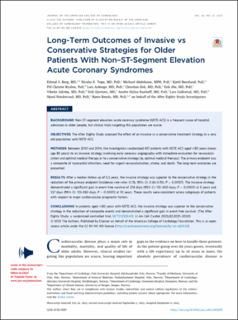Long-Term Outcomes of Invasive vs Conservative Strategies for Older Patients With Non–ST-Segment Elevation Acute Coronary Syndromes
Berg, Erlend; Tegn, Nicolai Kloumann; Abdelnoor, Michael; Ryalen, Pål Christie; Røysland, Kjetil; Aaberge, Lars; Eek, Christian; Øie, Erik Harald; Juliebø, Vibeke; Gjertsen, Erik; Ranhoff, Anette Hylen; Gullestad, Lars; Nordstrand, Njord; Bendz, Bjørn
Journal article, Peer reviewed
Published version

Åpne
Permanent lenke
https://hdl.handle.net/11250/3121722Utgivelsesdato
2023Metadata
Vis full innførselSamlinger
- Department of Clinical Science [2318]
- Registrations from Cristin [9791]
Originalversjon
Journal of the American College of Cardiology. 2023, 82 (21), 2021-2030. 10.1016/j.jacc.2023.09.809Sammendrag
Background
Non–ST-segment elevation acute coronary syndrome (NSTE-ACS) is a frequent cause of hospital admission in older people, but clinical trials targeting this population are scarce.
Objectives
The After Eighty Study assessed the effect of an invasive vs a conservative treatment strategy in a very old population with NSTE-ACS.
Methods
Between 2010 and 2014, the investigators randomized 457 patients with NSTE-ACS aged ≥80 years (mean age 85 years) to an invasive strategy involving early coronary angiography with immediate evaluation for revascularization and optimal medical therapy or to a conservative strategy (ie, optimal medical therapy). The primary endpoint was a composite of myocardial infarction, need for urgent revascularization, stroke, and death. The long-term outcomes are presented.
Results
After a median follow up of 5.3 years, the invasive strategy was superior to the conservative strategy in the reduction of the primary endpoint (incidence rate ratio: 0.76; 95% CI: 0.63-0.93; P = 0.0057). The invasive strategy demonstrated a significant gain in event-free survival of 276 days (95% CI: 151-400 days; P = 0.0001) at 5 years and 337 days (95% CI: 123-550 days; P = 0.0001) at 10 years. These results were consistent across subgroups of patients with respect to major cardiovascular prognostic factors.
Conclusions
In patients aged ≥80 years with NSTE-ACS, the invasive strategy was superior to the conservative strategy in the reduction of composite events and demonstrated a significant gain in event-free survival. (The After Eighty Study: a randomized controlled trial; NCT01255540)
